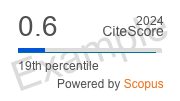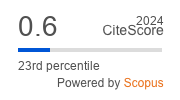RESISTANCE OF MYOCARDIAL MITOCHONDRIA IN ISCHEMIA-REPERFUSION INJURY OF THE HEART IN RATS ADAPTED TO CHRONIC HYPOXIA
https://doi.org/10.29001/2073-8552-2016-31-2-110-113
Abstract
The parameters of respiration, the value of the transmembrane potential, and Са2 +-binding capacity of the mitochondria isolated from the Langendorff(perfused hearts of rats adapted to chronic continuous normobaric hypoxia were analyzed. Modeling of ischemia and reperfusion in intact and adapted animals resulted in reduced Са2 +-binding capacity of mitochondria, indicating an increase in the sensitivity of mitochondrial permeability transition pore (MPT(pore) to calcium ions. At the same time, reduction in transmembrane potential, reduction in ADP/O ratio (the ratio of added ADP to oxygen consumption in State 3), and inhibition of mitochondrial state 3 respiration were observed. Along with that, the study demonstrated that the adaptation of animals to chronic hypoxia promotes the resistance of myocardial mitochondria to the negative effects of ischemia and reperfusion.
About the Author
E. S. ProkudinaRussian Federation
References
1. Литвицкий П.Ф., Сандриков В.А., Демуров Е.А. Адаптивные и патогенные эффекты реперфузии и реоксигенации миокарда. – М. : Медицина, 1994. – 320 с.
2. Лукьянова Л.Д. Современные проблемы адаптации к гипоксии. Сигнальные механизмы и их роль в системной регуляции // Пат. физиол. и экспер. тер. – 2011. – № 1. – С. 3– 19.
3. Марков В.А., Рябов В.В., Максимов И.В. и др. Вчера, сегодня, завтра в диагностике и лечении острого инфаркта миокарда // Сибирский медицинский журнал (Томск). – 2011. – Т. 26, № 2, вып. 1. – С. 8–13.
4. Argaud L., Gateau(Roesch O., Muntean D. et al. Specific inhibition of the mitochondrial permeability transition prevents lethal reperfusion injury // J. Mol. Cell. Cardiol. – 2005. – Vol. 38, No. 2. – P. 367–374.
5. Bradford M.M. A rapid and sensitive method for the quantitation of microgram quantities of protein utilizing the principle of protein(dye binding // Anal. Biochem. – 1976. – Vol. 72. – P. 248–254.
6. Chen X., Jennings D.B., Medeiros D.M. Impaired cardiac mitochondrial membrane potential and respiration in copper( deficient rats // J. Bioenerg. Biomembr. – 2002. – Vol. 34, No. 5. – P. 397–406.
7. Correa F., Garcia N., Robles C. et al. Relationship between oxidative stress and mitochondrial function in the post( conditioned heart // J. Bioenerg. Biomembr. – 2008. – Vol. 40, No. 6. – P. 599–606.
8. Gomez L., Paillard M., Thibault H. et al. Inhibition of GSK3beta by postconditioning is required to prevent opening of the mitochondrial permeability transition pore during reperfusion // Circulation. – 2008. – Vol. 117, No. 21. – P. 2761–2768.
9. Halestrap A.P. A pore way to die: the role of mitochondria in reperfusion injury and cardioprotection // Biochem. Soc. Trans. – 2010. – Vol. 38, No. 4. – P. 841–860.
10. Mandelzweig L., Battler A., Boyko V. et al. The second Euro Heart Survey on acute coronary syndromes: Characteristics, treatment, and outcome of patients with ACS in Europe and the Mediterranean Basin in 2004 // Eur. Heart J. – 2006. – Vol. 27, No. 19. – P. 2285–2293.
11. Neckar J., Szarszoi O., Herget J. et al. Cardioprotective effect of chronic hypoxia is blunted by concomitant hypercapnia // Physiol. Res. – 2003. – Vol. 52, No. 2. – P. 171–175.
12. Scaduto R.C., Grotyohann L.W. Measurement of mitochondrial membrane potential using fluorescent rhodamine derivatives / / Biophys. J. – 1999. – Vol. 76, No. 1, Pt. 1. – P. 469–477.
13. Selye H. The Story of the Adaptation Syndrome. – Montreal, 1952. – 225 p.
14. Singh I.N., Sullivan P.G., Deng Y. et al. Time course of post( traumatic mitochondrial oxidative damage and dysfunction in a mouse model of focal traumatic brain injury: implications for neuroprotective therapy // J. Cereb. Blood Flow Metab. – 2006. – Vol. 26, No. 11. – P. 1407–1418.
15. Zhu W.Z., Xie Y., Chen L. et al. Intermittent high altitude hypoxia inhibits opening of mitochondrial permeability transition pores against reperfusion injury // J. Mol. Cell. Cardiol. – 2006. – Vol. 40, No. 1. – P. 96–106.
Review
For citations:
Prokudina E.S. RESISTANCE OF MYOCARDIAL MITOCHONDRIA IN ISCHEMIA-REPERFUSION INJURY OF THE HEART IN RATS ADAPTED TO CHRONIC HYPOXIA. Siberian Journal of Clinical and Experimental Medicine. 2016;31(2):110-113. (In Russ.) https://doi.org/10.29001/2073-8552-2016-31-2-110-113




.png)





























